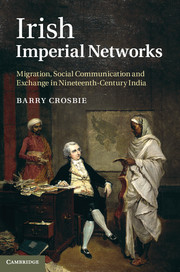Book contents
- Frontmatter
- Contents
- Preface
- Acknowledgements
- Abbreviations
- 1 Introduction
- 2 The business of empire
- 3 British overseas expansion, Ireland and the sinews of colonial power
- 4 From trade to dominion
- 5 Religion, civil society and imperial authority
- 6 From Company to Crown rule
- 7 Imperial crisis and the age of reform
- 8 Conclusion
- Glossary
- Bibliography
- Index
- References
5 - Religion, civil society and imperial authority
Published online by Cambridge University Press: 05 December 2011
- Frontmatter
- Contents
- Preface
- Acknowledgements
- Abbreviations
- 1 Introduction
- 2 The business of empire
- 3 British overseas expansion, Ireland and the sinews of colonial power
- 4 From trade to dominion
- 5 Religion, civil society and imperial authority
- 6 From Company to Crown rule
- 7 Imperial crisis and the age of reform
- 8 Conclusion
- Glossary
- Bibliography
- Index
- References
Summary
Introduction
As the Whigs ascended to power and the battle for parliamentary reform raged in Britain during the 1830s and 1840s, the British Empire began to yield further opportunities for the rising Catholic Irish middle classes eager to join their more established Protestant counterparts in imperial service. Under the Whig government, Irish Catholic seminaries and religious institutions began to supply numerous Vicars Apostolic and clergy to attend to the spiritual requirements of the Empire’s ever-expanding Irish migrant communities. While Irish Protestants already figured prominently within the British Empire’s expanding network of missionary societies and church activity in Africa, Asia and the Pacific by the 1830s, Irish Catholic prelates, too, became deeply embedded in debates concerning religion, civil society and the exercise of imperial authority, especially in India. This chapter examines how during the second half of the nineteenth century, several Irish religious networks came to dominate the administration of Catholic communities in the south and west of India. It argues that following the establishment of a number of Catholic religious institutions in Ireland after Catholic emancipation in 1829, such as All Hallows College, Dublin, whose aim it was to supply the British Empire and North America with priests for its growing number of Catholic migrants, the particular strain of Catholicism practised in Ireland came to exert a notable degree of influence upon many aspects of colonial life in India. In the vicariate of Madras, for example, Propaganda Fide, the official Roman Catholic body responsible for overseeing Catholic missionary work overseas, appointed five successive Irish titular bishops, giving rise to a prolonged period of Irish dominance in the Madras vicariate spanning almost eighty years. Although given a mandate to administer the spiritual requirements of their Indian flock, existing communities of Indian Catholics did not always endorse the notions and practices translated to India by these developing Irish Catholic religious networks, particularly when in relation to the contentious issue of caste.Yet, this chapter also explores how Irish religious interaction with Indian society was not always negative. In addition to the close personal connections forged between Irish Catholic soldiers, military chaplains and Vicars Apostolic in the Presidency Towns of Madras, Bombay and Calcutta, Irish prelates set about introducing reconstructed parochial systems in India – modelled along Irish lines – through the building of churches and other ecclesiastical structures, and promoted the education of (high- and low-caste) Indian and Eurasian children. Within these religious networks, Irish Catholic prelates accumulated substantial bases of revenue from soldiers’ wills, donations and monetary contributions. In turn, remittances conveyed through these religious networks also played important roles in reconstructing Catholic infrastructure in Ireland in the wake of emancipation through the education of siblings and building of churches, schools, hospitals and other ecclesiastical structures. Given the tight cultural bonds that existed between Irish Catholic soldiers and Irish military chaplains stationed within the walls of British garrison towns in India, invariably news, ideas and intelligence spread through these religious networks in equal measure.By the mid nineteenth century, the development of a new language of national politics had given rise to a sense of commonality between sections of the Irish Catholic and Indian Hindu populace. Around this time, the rudiments of a Catholic revolutionary nationalism began to be articulated by members of the Fenian movement in Ireland and North America, who were encouraged by British problems in the Crimea and especially in India during the 1850s. News of suspicion among East India Company officials toward its Irish soldiers’ Roman Catholicism quickly spread from military cantonments in Agra or Madras to Cork and Dublin where an expanding imperial press system brought regular news of the Empire onto the printed pages of the Cork Examiner and the Freeman’s Journal. During the second half of the nineteenth century, for example, Gaelic-speaking Roman Catholic soldiers in India, often supported by influential Irish figures within the Indian Catholic Church’s hierarchy, played key roles in debates over the exercise of imperial authority and provided an important reference point for Britain in its attempts to understand and make sense of the indigenous cultures of South Asia.
- Type
- Chapter
- Information
- Irish Imperial NetworksMigration, Social Communication and Exchange in Nineteenth-Century India, pp. 129 - 168Publisher: Cambridge University PressPrint publication year: 2011



